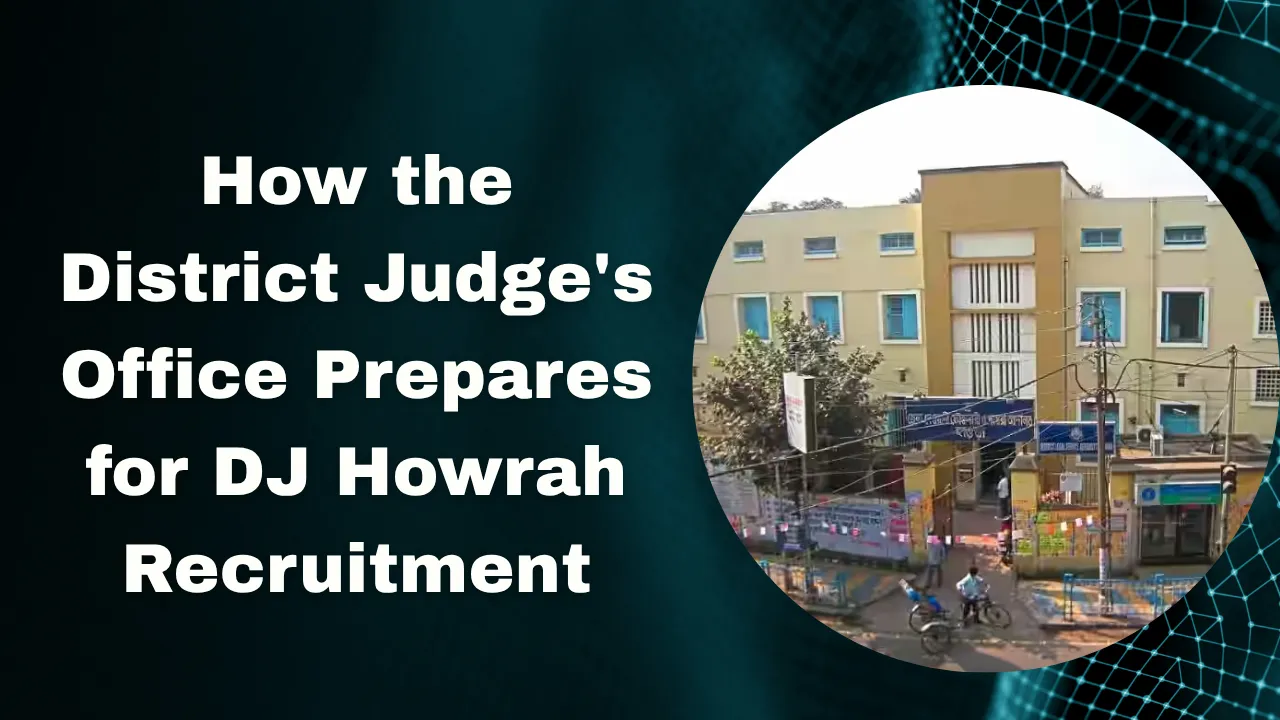How the District Judge’s Office Prepares for DJ Howrah Recruitment: Every year, the District Judge’s Office in Howrah undertakes a detailed and disciplined exercise to fill roles like Lower Division Clerk, Stenographer Grade‑III, Process Server, and Group D staff. The annual DJ Howrah Recruitment is a hallmark of transparency and efficiency, driven by careful planning and inter-departmental coordination. From crafting notifications to announcing panel lists, the recruitment team ensures each step runs like clockwork—meeting legal standards, candidate needs, and logistical demands.
In this article, we uncover the layers behind DJ Howrah Recruitment preparation. You’ll learn about key administrative processes such as notification drafting, application management, exam logistics, evaluation, merit panel formation, and large-scale coordination. These unseen efforts shape a fair and functional recruitment cycle rooted in judicial integrity.
How the District Judge’s Office Prepares for DJ Howrah Recruitment
In preparing for DJ Howrah Recruitment, the District Judge’s Office follows a clear, stage-by-stage strategy. It starts with notification drafting—setting eligibility, vacancies, pay scales, and exam dates. Coordinating with the Calcutta High Court and local admin, they schedule application windows and document verification. Subsequently, they handle exam venue booking, hiring invigilators, publishing admit cards, and executing written tests and skill assessments. Post-evaluation, the office compiles merit-based panels, manages reserved category lists, and issues provisional appointment letters. Behind every announcement lies a web of legal review, data handling, and inter-agency alignment.
Recruitment Preparation Overview
| Phase | Key Activities |
| Notification Drafting | Define posts (LDC, Steno, Process Server, Group D), eligibility, pay scale; obtain judicial approval |
| Application & Document Intake | Open forms, collect fees, upload documents, verify certificates |
| Exam Logistics | Reserve halls, arrange OMR sheets, invigilators; ensure exam security |
| Admit Card & Communication | Generate roll numbers, send cards, share instructions via email/SMS |
| Written & Skill Assessments | Conduct exams, shorthand/typing rounds under supervision |
| Evaluation & Result Processing | Scan OMRs, grade papers, tabulate scores, compile category-wise merit lists |
| Panel Creation | Form merit panel valid up to a year; manage reservations |
| Appointments & Onboarding | Issue provisional letters, complete document checks, oversee joining formalities |
| Coordination & Oversight | Liaise with Calcutta High Court, district admin, police, local authorities for compliance |
Notification and Approval
The recruitment cycle starts with drafting a detailed notification—covering posts like LDC, Stenographer Grade‑III, Process Server, and Group D. This draft specifies educational qualifications (e.g., 12th pass with shorthand for Steno; VIII pass for Group D) and is reviewed and approved by the District Judge before being published online.
Application Intake and Verification
Applications open in online or offline mode, with candidates submitting ID proof, educational certificates, caste/PWD proofs, and application fees. The recruitment cell conducts rigorous document verification, tracking entries to ensure accuracy and eliminate duplicates.
Exam Logistics Management
Securing exam venues—like government schools and auditoriums—is crucial. The District Judge’s Office books exam halls, finalizes dates, and arranges invigilators (retired teachers or officials). They manage OMR sheets and ensure exam material confidentiality, supported by police oversight for security compliance.
Admit Cards and Communication
Roll numbers and seat allocations are finalized and admit cards generated via the recruitment portal. Issuance occurs digitally and by post, with guidelines on exam day procedures and documents to bring.
Conducting Exams and Skill Tests
On exam day, invigilators manage seating and uphold protocols. OMR answer sheets are scanned immediately post-exam. Skill tests—such as shorthand transcription and typing—are separately scheduled for eligible candidates.
Evaluating and Publishing Results
OMR responses are scanned and graded, while skill tests are manually reviewed. Scores are aggregated and candidate rankings finalized. Merit lists are prepared for all categories, following reservation norms.
Creating the Merit Panel
A panel of vetted candidates is drawn based on final scores. This merit list remains valid for up to a year and may be used to fill vacancies as they arise.
Appointments and Onboarding
Successful candidates receive provisional offer letters. They submit original documents—ID, education certificates, medical fitness—and coordinate with administrative staff for their joining dates. The recruitment cell ensures a seamless onboarding process.
District-Level Coordination
The District Judge’s Office coordinates with local authorities—Calcutta High Court, district administration, police, and exam centers—for secure, smooth recruitment. Internal audits and public notices help maintain transparency.
FAQs
1. When will the DJ Howrah recruitment notification be released?
The detailed notification—covering posts, eligibility, application dates, and exam pattern—is published online and posted in public notice boards at the District Court.
2. What is the selection process?
Candidates go through a written exam, followed by shorthand or typing skill tests (for stenographer posts), and verification. Final selection is based on combined marks.
3. How are exam centres arranged?
The District Judge’s Office selects venues based on capacity and location. They secure halls from schools and auditoriums, ensure invigilation, and coordinate with local police for security.
4. How is the merit list published?
After evaluations, results and category-wise merit panels are uploaded on the official court website. These panels guide final appointments.
5. What about provisional appointments and document verification?
Provisional letters are issued to selected candidates. Originals are checked in person, and once verified, candidates complete formal joining as per court HR rules.
Final Thought
The DJ Howrah Recruitment is a finely tuned multi-stage process—rooted in disciplined planning, inter-departmental coordination, and judicial oversight. From early notification drafting to onboarding, every step is designed for fairness, legal adherence, and candidate care. While it may seem like a routine cycle, the administrative depth behind the scenes reflects the court’s commitment to justice and public trust.















